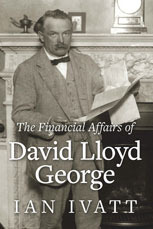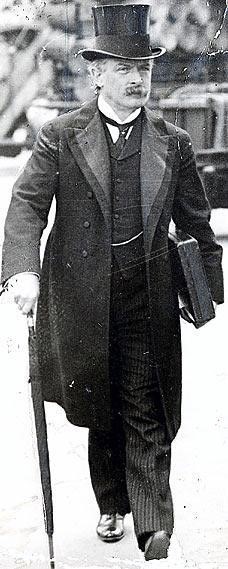
The Financial Affairs of David Lloyd George by Ian Ivatt – Book review
Do people really care where their politicians get their money? Certainly at times of extraordinary scrutiny like the MPs’ expenses scandal of 2009, the anger and revulsion for the ways in which MPs claimed public money tarred the reputation of politicians of all parties and led to the ending of some careers. It is also the case that political opponents, their allies in the press and their followers on social media are always trying to stir up interest in the individual financial affairs of prominent politicians. That internet meme of Donald Trump and Nigel Farage together in a gold lift is a pertinent example. By and large however politicians don’t tend to lose their careers over financial indiscretions. They may, like David Laws, have to resign for a while but often get brought back into the inner circle; or quietly stand down like Speaker Martin before resuming political life in the House of Lords.
Certainly David Lloyd George seems to have survived all the scandals and accusations of financial shenanigans levelled at him over his long political career and yet flourished. To help understand how he managed this, Ian Ivatt has produced a fascinating study examining, assessing and analysing Lloyd George’s attitude to financial affairs; the first to focus on LG’s approach to money over the course of his career as a solicitor and politician. Using his experience as a chartered tax accountant, Ivatt follows Lloyd George’s financial progress from indentured pupil of a North Wales solicitor to number 10 Downing Street and beyond. He charts the ups and downs of LG’s financial position, from his humble though not impoverished beginnings, through his early legal and political career and shows how he survived the scandals of the Marconi Affair and the sale of honours, and how through politics, literature, journalism and agriculture, gradually accumulated the great wealth and financial stability which he always craved. While Ivatt does not set out to rescue Lloyd George’s reputation in financial matters, his book is, at least in part, an interesting counterpoint to the much repeated and damaging accusations which have been levelled at LG over the years.
This is not a long book and the main points of Lloyd George’s life story are told briskly without unnecessary embellishment. At each stage of LG’s career however the salient financial details are identified and fleshed out , with helpful comparison between the monetary values of salaries, share dealings or literary fees of the time and today (also usefully reproduced in a separate appendix). It is clear that Ivatt has read and researched widely for this project. It is the case that the great majority of references are to secondary works but political and newspaper archives are also cited, as well as some interesting interviews, including one with Jennifer Longford, the daughter of Frances Stevenson who was of course a frequent visitor to Lloyd George Society weekend schools and latterly one of our Vice Presidents.
However as well as going over the familiar aspects of LG’s career and income, Ivatt has looked more closely at his life after leaving office and in particular his career as a farmer. The estate Lloyd George purchased and added to at Churt in Surrey, eventually amounted to 850 acres, 300 of which were used for horticulture. Ivatt shows that none of these purchases were made with help from the notorious Political Fund which LG built up from the sale of honours, but came from legitimate enterprises, mainly the sale of his War Memoirs and other publications. The detailed information which Ivatt is able to set out in this chapter of the book has come from a cache of privately held records dating from the late 1920s to the 1940s which, presumably, have not been available to previous scholars. The story of Lloyd George the soft fruit grower and beekeeper is an attractive and unusual one, often overlooked or underplayed in the studies of a great political life, and Ivatt has succeeded in bringing this neglected aspect of LG’s contribution to life.
This is an intriguing tale, cleverly told; the strands of LG’s different financial dealings adhering together neatly against the wider background of his political and literary triumphs. Ian Ivatt’s astute study is a worthwhile addition to the literature about the Welsh Wizard.
Contributing Editor of the Journal of Liberal History and Secretary of the Lloyd George Society
